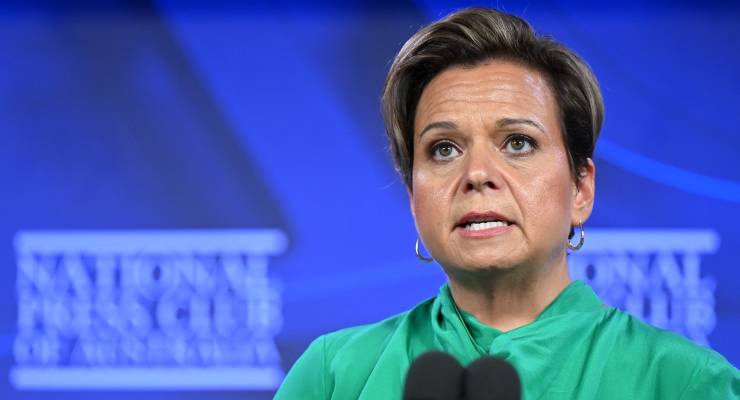
Never let it be said that Australian journalists pursue issues dictated by the commercial interests of the companies they work for rather than the public interest. That would be a shocking allegation, given the extent to which that would be an abuse of the special status of journalists to ask questions of the powerful.
That said, it’s a bit hard to account for what happened at the National Press Club yesterday, when Communications Minister Michelle Rowland gave an address and then faced the doubtless daunting Press Gallery in the question-and-answer session that followed.
It’s unlikely too many people know about it, but there’s currently a full-on brawl going on over the government’s proposed regulation to prioritise the prominence of free-to-air broadcaster apps on smart TVs ahead of those of streaming services. Opposition to the proposal is being led to the pay-TV lobby group, ASTRA, taking out press ads warning people the government would be controlling their televisions. The free-to-air lobby group, Free TV Australia, says that’s rubbish. Sky News is, predictably, using the issue to label Labor “the enemy of freedom“.
Free TV Australia has long been a thoroughly malignant influence on Australian media policy. ASTRA is only better because it has traditionally been the victim of the free-to-airs’ lobbying efforts, but it’s every bit as self-interested, and the poisonous taint of News Corp infests them. But, by and large, this is an issue of precisely zero interest to ordinary Australians.
Not so, according to Sky’s Tom Connell. Connell is now world-famous for being humiliated by Francesca Albanese after his offensive and asinine question last week on Gaza, but it was back to work for Tom yesterday, asking Rowland about… the prominence regulation. “Your own policy paper on that said it would give free-to-air stations effectively an advantage in the streaming age. Is there any other policy area where one type of company is given advantage over another like that?”
But not to be outdone, Reece D’Alessandro from free-to-air broadcaster Nine also rose and asked Rowland a quite different question about the prominence regulation — when would it be introduced to Parliament?
Paul Sakkal from Nine newspapers then immediately followed with a question about age verification on porn websites, telling Rowland that experts say Rowland is trusting the porn industry too much on child safety: “On what basis do you trust the pornography industry to engage in a cooperative code?” he demanded.
Age verification for porn sites is a draconian idea that, despite having previously been found to be unworkable, is again having something of a moment among internet censors around the world, including in Texas where the “porn passport” requirement is coupled with “health warnings” without any evidentiary basis. It’s the online equivalent of “papers please” — a demand that you hand over ID documents such as a driver’s licence or passport in order to prove you’re who you say you are.
Also on board with the idea is Morrison-appointed government internet censor Julie Inman Grant, who wants a digital “papers please” requirement for adult sites, despite the sheer stupidity of creating an additional honeypot of rich personal information hosted offshore.
For reasons that are unclear, Nine newspapers are also backing this, with both stories and editorials hyping moral panic over children accessing pornography and backing “papers please” requirements for adult sites. The story resulting from Sakkal’s question was thus labelled “Minister puts trust in porn industry to shield children from harm“.
Sounds like “you can’t trust the porn industry” is the preferred angle of attack from Nine newspapers — a strange argument to make given they support mandating handing key identity documents to that industry. Perhaps they haven’t quite thought that one through?








Crikey is committed to hosting lively discussions. Help us keep the conversation useful, interesting and welcoming. We aim to publish comments quickly in the interest of promoting robust conversation, but we’re a small team and we deploy filters to protect against legal risk. Occasionally your comment may be held up while we review, but we’re working as fast as we can to keep the conversation rolling.
The Crikey comment section is members-only content. Please subscribe to leave a comment.
The Crikey comment section is members-only content. Please login to leave a comment.